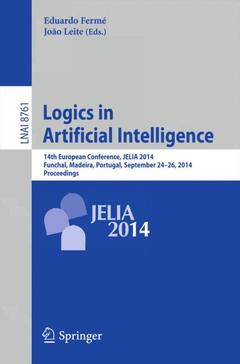Description
Logics in Artificial Intelligence, 2014
14th European Conference, JELIA 2014, Funchal, Madeira, Portugal, September 24-26, 2014, Proceedings
Lecture Notes in Artificial Intelligence Series
Language: English
Subjects for Logics in Artificial Intelligence:
Keywords
answer set programming; argumentation; automated reasoning; belief revision; data mining; databases; description logics; fuzzy logic programming; hypergraph; knowledge representation and reasoning; logic programming; logics for uncertain and probabilistic reasoning; non-classical logics; nonmonotonic reasoning; query processing; reasoning about actions and causality; similarity orders
Publication date: 09-2014
704 p. · 15.5x23.5 cm · Paperback
704 p. · 15.5x23.5 cm · Paperback
Description
/li>Contents
/li>
This book constitutes the proceedings of the 14th European Conference on Logics in Artificial Intelligence, JELIA 2014, held in Funchal, Madeira, Portugal, in September 2014. The 35 full papers and 14 short papers included in this volume were carefully reviewed and selected from 121 submissions. They are organized in topical sections named: description logics; automated reasoning; logics for uncertain reasoning; non-classical logics; answer-set programming; belief revision; dealing with inconsistency in ASP and DL; reason about actions and causality; system descriptions; short system descriptions; and short papers. The book also contains 4 full paper invited talks.
Query Answering over Description Logic Ontologies.- Tools for the Investigation of Substructural and Paraconsistent Logics.- Non-classical Planning with a Classical Planner: The Power of Transformations.- Opportunities for Argument-Centric Persuasion in Behaviour Change.- The Fuzzy Description Logic G-FL0 with Greatest Fixed-Point Semantics.- Tight Complexity Bounds for Reasoning in the Description Logic BEL.- Relevant Closure: A New Form of Defeasible Reasoning for Description Logics.- Error-Tolerant Reasoning in the Description Logic EL.- Sub-propositional Fragments of the Interval Temporal Logic of Allen’s Relations.- SAT Modulo Graphs: Acyclicity.- Enumerating Prime Implicants of Propositional Formulae in Conjunctive Normal Form.- Improving the Normalization of Weight Rules in Answer Set Programs.- Logical Foundations of Possibilistic Keys.- Possibilistic Boolean Games: Strategic Reasoning under Incomplete Information.- LEG Networks for Ranking Functions.- Logics for Approximating Implication Problems of Saturated Conditional Independence.- Non-Classical Logics Finitary S5-Theories.- Efficient Program Transformers for Translating LCC to PDL.- On the Expressiveness of the Interval Logic of Allen’s Relations over Finite and Discrete Linear Orders.- Only-Knowing a la Halpern-Moses for Non-omniscient Rational Agents: A Preliminary Report.- Answer-Set Programming A Complexity Assessment for Queries Involving Sufficient and Necessary Causes.- Inductive Learning of Answer Set Programs.- Stable Models of Fuzzy Propositional Formulas.- A Free Logic for Stable Models with Partial Intensional Functions.- Constructive Models for Contraction with Intransitive Plausibility Indifference.- Four Floors for the Theory of Theory Change: The Case of Imperfect Discrimination.- Revisiting Postulates for Inconsistency Measures.- A Translation-Based Approach for Revision of Argumentation Frameworks.- Dealing with Inconsistency in ASP and DL Preserving Strong Equivalence whileForgetting.- Computing Repairs for Inconsistent DL-programs over EL Ontologies.- A Prioritized Assertional-Based Revision for DL-Lite Knowledge Bases.- Modular Paracoherent Answer Sets.- Action Theories over Generalized Databases with Equality Constraints.- A Dynamic View of Active Integrity Constraints.- Similarity Orders from Causal Equations.- Verification of Context-Sensitive Knowledge and Action Bases.- System Descriptions System aspmt2smt: Computing ASPMT Theories by SMT Solvers.- A Library of Anti-unification Algorithms.- The D-FLAT System for Dynamic Programming on Tree Decompositions.- ACUOS: A System for Modular ACU Generalization with Subtyping and Inheritance.- Drawing Euler Diagrams from Region Connection Calculus Specifications with Local Search.- Short Papers.- Probabilistic Abstract Dialectical Frameworks.- Argumentative Aggregation of Individual Opinions.- Measuring Dissimilarity between Judgment Sets.- Exploiting Answer Set Programming for Handling Information Diffusion in a Multi-Social-Network Scenario.- Reasoning about Dynamic Normative Systems.- A Modal Logic of Knowledge, Belief, and Estimation.- A Logic for Belief Contraction.- Logic Foundations of the OCL Modelling Language.- Constraint-Based Algorithm for Computing Temporal Invariants .- Answer Set Solver Backdoors.- Incremental SAT-Based Method with Native Boolean Cardinality Handling for the Hamiltonian Cycle Problem.- Revisiting Reductants in the Multi-adjoint Logic Programming Framework.
© 2024 LAVOISIER S.A.S.




